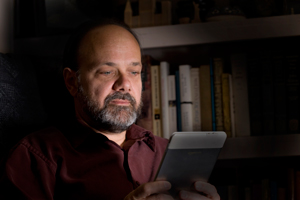Volume 32 Number 1 Fall 2009
In this Issue
Features
- Rural Legends
- Kindling
- Fly Boys
- Personal Best
The Editor's Page
- Lady in Red
- Letters to the Editor
Along Middle Path
- Henry Toutain Named Dean of Students
- Saving Children
- In and Out at Kenyon
- Jolly Good Fellows
- Kenyon in the News
- The Hot Sheet
- Best in the Nation
- Doing Philander Proud
- Gambier is Talking About...
- Sound Bites
- What's your Kenyon Quotient?
Sports
- Anatomy of an Athlete
- Sports Round-Up
Books
- Beyond "Baby Panic"
- Reviews
Office Hours
- Loving Lexica
- Changing Lives with Discipline and Imagination
- Burning Question for Glenn McNair, Associate Professor of History
- Not in my Job Description: A Real Fling
Alumni News
- Forged in Steel
- Reel Life
- Obituaries
- Alumni Digest
The Last Page
- Suburban Legends
Screen Test
By Sergei Lobanov-Rostovsky
Related Stories
I feel like a traitor.
One of my students, catching sight of my new toy during a recent bus ride across Ireland, recently cried out in dismay, "You have a Kindle!" As someone who loves books, and tries to get my students to share that love, I understood how she felt. But before I could explain, the student sitting across from her looked up and said, "You've got a Kindle? Cool! Can I try it?"
Normally, I'm what tech companies call a late adopter. The lights on my VCR still flash plaintively—12:00, 12:00, 12:00—as if time has given up on me in disgust. I can't pass a used record store without thumbing through the ancient LPs to see if they've got that replacement copy of From Her to Eternity I've been searching for since the great roof leak of 1985. For me, a text is what you find, copiously underlined, when you open a book.

That's right, a book. If they still sold scrolls, I'd be the guy with the library that smells like sheep. And why not? Books are a new-fangled invention. In 1490, John of Trittenheim wrote in his treatise In Praise of Scribes, "The word written on parchment will last a thousand years ... The most you can expect a book of paper to survive is two hundred years. Yet, there are many who think they can entrust their works to paper. Only time will tell." John of Trittenheim, it seems, was another late adopter.
So what am I doing with a Kindle? Call it curiosity. Call it fatalism. Or call it an aching back. I teach Shakespeare. Anyone remember how it feels to heft a copy of the complete plays? Great Birnam Wood to high Dunsinane hill comes, one semester after another, and I've started to feel as if I've carried every log. Whose idea was it to make books from wood? My new Kindle can hold 1,500 endless Russian novels-a lifetime supply of starving peasants, existential despair, and pale countesses waltzing in the snow-and I can carry them all around with me, not as a spine-twisting load in my backpack, but with no more effort than a flicker of light caught in a jar.
Still, reading Shakespeare on a Kindle can feel like drinking champagne from a plastic cup. When I first picked it up, it felt like an oversized pocket calculator, and there are a lot of buttons for a simple act like reading. (What's SYM do, anyway? Oh no!) It's great for traveling, but I can't picture myself curling up with my Kindle on a cold winter night. To be honest, I miss the smell of dust, and the way pages spill out of cheap paperbacks like students leaving class on the last day of the term. When you buy a book, you can feel strangely proud of yourself, as if you've just shaken hands with Walt Whitman or bought Socrates a round. Downloading an e-book feels ... well, like doing your taxes.
Don't get me wrong. I'm all for progress, and I'm convinced that what Amazon has produced is only the first of its kind: e-book readers will quickly become cheaper, lighter, and more responsive to the ways people read. On YouTube, you can see a prototype version of an electronic screen that can be rolled up or folded, changing its image as easily as you'd turn the pages of a book. Digital books can be published at very little cost, sent around the world in an instant, and hidden easily from the secret police. But what happens, I keep wondering, when the lights go out?
A book is just a box made of paper and glue, but in it burns a Promethean fire. As long as there are readers, we'll need books. But not only books. Just as we listen to both iPods and violins, we will embrace any technology that moves us.
Now can someone tell me how to turn this thing on?
Sergei Lobanov-Rostovsky, a professor of English, is back on campus after a year directing the 2008-09 Kenyon-Exeter Program in England.
Gambier, Ohio 43022
(740) 427-5158

 Delicious
Delicious Facebook
Facebook StumbleUpon
StumbleUpon Digg
Digg reddit
reddit